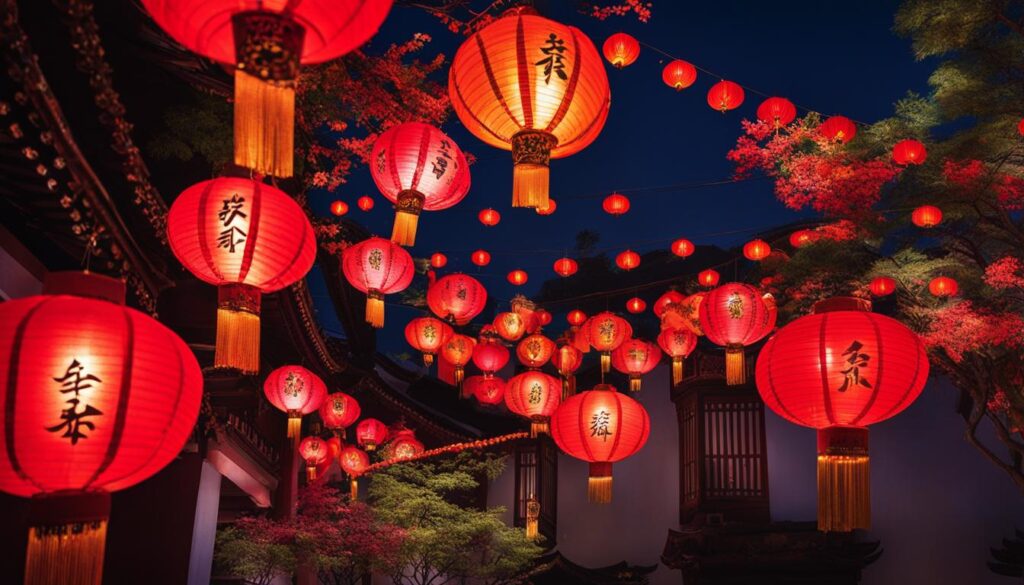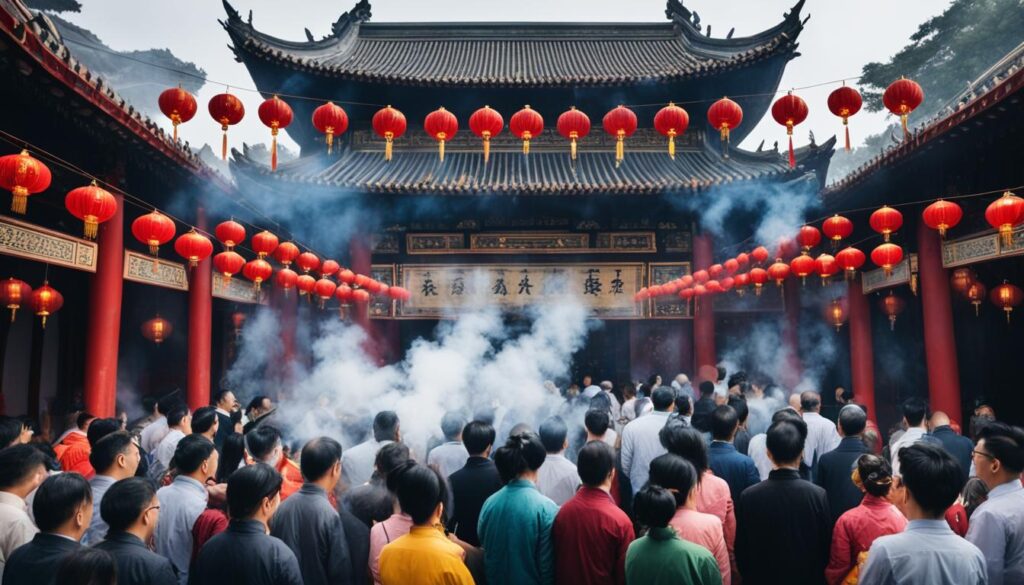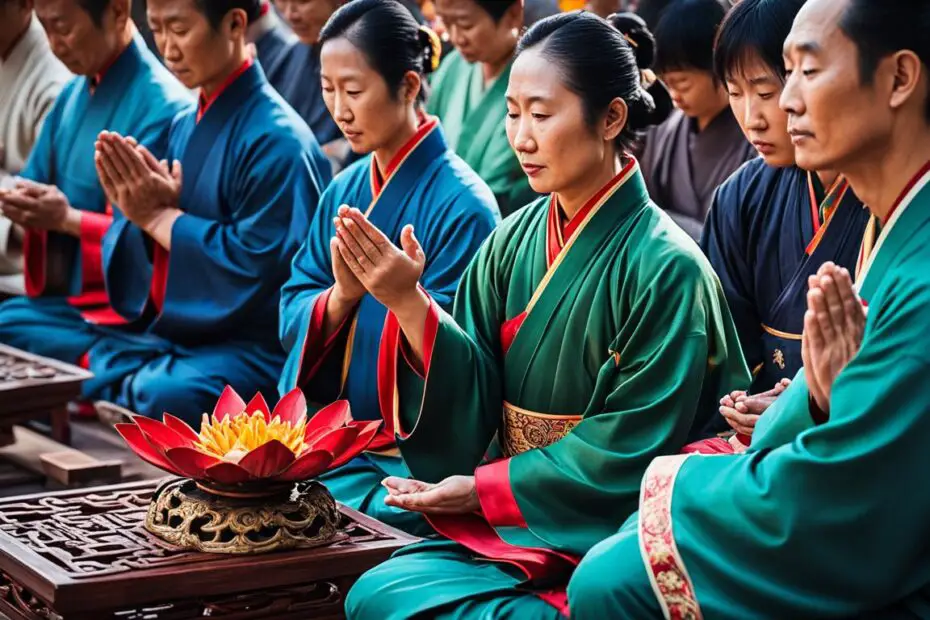Prayer in traditional Chinese culture holds a profound significance, reflecting the deep-rooted traditions of Taoism, Confucianism, and Chinese folk religion. This unique blend of belief systems, developed over thousands of years, shapes the prayer practices and rituals of the Chinese people. Centered around the principles of harmony, spirituality, and the pursuit of wisdom, traditional Chinese prayer traditions offer a gateway to connect with the divine and seek guidance in their lives.
Prayer in traditional Chinese culture is deeply embedded in the daily lives of individuals and the collective community. It goes beyond individual requests for personal well-being and prosperity, emphasizing the broader ideals of unity, balance, and cultural identity. Through prayer, the Chinese people strive to cultivate a sense of harmony between themselves, nature, and the spirit world.
- Traditional Chinese prayer practices are influenced by Taoism, Confucianism, and Chinese folk religion.
- Chinese prayer traditions emphasize harmony, spirituality, and the pursuit of wisdom.
- Prayer in traditional Chinese culture connects individuals with the divine and seeks guidance in life.
- Chinese prayer traditions play a crucial role in fostering unity, shared values, and cultural identity within the community.
- Prayer in traditional Chinese culture shapes moral and ethical values, influencing art, literature, and philosophy.
Origins of Chinese Religions
Chinese religions, including Chinese folk religion, Confucianism, and Taoism, have deep roots in ancient East Asian cultures. These belief systems have evolved over thousands of years, shaping the unique prayer practices and rituals of the Chinese people.
Chinese folk religion, passed down through generations, encompasses a series of beliefs and rituals that date back thousands of years. It reflects the spiritual connection between humans and the natural world, emphasizing harmony, ancestral worship, and the veneration of local deities.
Confucianism, developed from the teachings of Confucius during the Spring and Autumn Period of Chinese history, focuses on moral and ethical principles. It places great importance on social harmony, righteousness, filial piety, and the pursuit of wisdom.
Taoism, with its origins intertwined with ancient Chinese philosophy and spirituality, has evolved throughout Chinese history. Taoism emphasizes the harmony of yin and yang, the pursuit of the Tao (the Way), and achieving alignment with the natural order of the universe.
These ancient belief systems have had a profound influence on Chinese prayer traditions and beliefs, shaping the spiritual fabric of Chinese culture.

“Chinese religions have provided a rich spiritual and philosophical foundation for the Chinese people. From the enduring practices of Chinese folk religion to the teachings of Confucius and the wisdom of Taoism, these belief systems have shaped the values, rituals, and prayers of countless generations.”
Sacred Texts in Chinese Religions
In Chinese religions, sacred texts hold immense significance as guiding sources for prayer and spiritual practices. While Chinese folk religion does not have official sacred texts, followers often regard certain Confucian and Taoist texts as sacred and highly revered.
In Confucianism, the Five Classics and Four Books are considered sacred texts. These texts encompass a wide range of subjects, including history, poetry, philosophy, and rituals. Among these, the Lun Yu, or the Analects of Confucius, holds the utmost importance. It contains the teachings and sayings of Confucius, emphasizing morals, social harmony, and the cultivation of virtues.
Taoism, on the other hand, places great emphasis on the Tao Te Ching as its most important sacred text. This ancient Chinese classic, attributed to Laozi, explores the concept of Tao (the Way) and offers guidance on achieving harmony and balance with the natural world. Additionally, Taoism has various sects, each with its own set of sacred texts that align with their specific beliefs and practices.
These sacred texts play a vital role in shaping Chinese prayer traditions. They provide wisdom, guidance, and moral principles to individuals seeking a deeper connection with the divine. Through the study and contemplation of these texts, believers strive to align their thoughts and actions with the teachings of their chosen faith, fostering personal growth and spiritual enlightenment.
Sacred Texts in Chinese Religions
| Religion | Sacred Texts |
|---|---|
| Confucianism | The Five Classics The Four Books Lun Yu (Analects of Confucius) |
| Taoism | Tao Te Ching Additional texts based on sects |
Core Beliefs in Chinese Religions
Chinese folk religion, Confucianism, and Taoism form the core beliefs of Chinese religions, shaping the spiritual fabric of the Chinese people. Each of these belief systems offers unique insights into the nature of the universe, the importance of human relationships, and the pursuit of harmony and enlightenment.
Chinese Folk Religion: Animism and Harmony
Chinese folk religion is deeply rooted in animism, the belief that spirits reside in the natural world and influence human events. The Chinese people hold a profound reverence for nature and seek to maintain harmony with the spiritual realm. The balance of yin and yang, the complementary forces that underpin all existence, is essential to ensure prosperity and well-being.
Confucianism: Relationships and Virtue
Confucianism emphasizes the importance of strong relationships and virtuous conduct in personal and societal life. The teachings of Confucius promote filial piety, respect for authority, and the cultivation of benevolence. By upholding harmonious relationships and practicing moral virtues, individuals contribute to the well-being of society as a whole.
Taoism: The Path to Harmony with the Tao
Taoism centers around the concept of Tao, the ultimate source of creation and the natural order of the universe. Adherents of Taoism seek to align themselves with the Tao through simplicity, spontaneity, and living in harmony with nature. The goal is to achieve perfect accord with the Tao, transcending dualities and attaining spiritual enlightenment.
“The Tao that can be spoken is not the eternal Tao.
The name that can be named is not the eternal name.”
-Tao Te Ching
These core beliefs in Chinese religions provide a philosophical foundation that guides the spiritual practices and moral values of the Chinese people. They underscore the importance of living in harmony with nature, fostering strong relationships, and attaining spiritual enlightenment on the path to fulfillment and balance.

Core Practices in Chinese Religions
Core practices in Chinese religions, including Chinese folk religion, Confucianism, and Taoism, play a vital role in the spiritual lives of believers. These practices are rich in ritualistic traditions that connect individuals with the divine, foster harmony, and maintain spiritual balance.
Chinese Folk Religion: Ritual Offerings to Draw the Gods Near
Chinese folk religion places a strong emphasis on ritualistic practices designed to draw the gods near and ask for blessings. One of the core practices in Chinese folk religion is the offering of incense and food at shrines and temples. These offerings symbolize respect and gratitude towards the gods while creating a sacred space for communication between the earthly and divine realms. By engaging in these ritualistic practices, believers seek divine guidance, protection, and spiritual blessings in their daily lives.
Confucianism: Upholding Harmony Through Rituals
In Confucianism, core practices revolve around upholding harmony in relationships and society. Confucius emphasized the importance of respecting one’s elders, practicing filial piety, and demonstrating proper conduct in all aspects of life. Rituals in Confucianism vary among believers but often include ceremonies honoring ancestors, offering sacrifices, and performing specific rituals during festivals and important life events. Through these rituals, Confucian followers seek to honor their ancestors, strengthen family ties, and cultivate harmony within society.
Taoism: Recitation and Meditation for Spiritual Enlightenment
Taoist practices focus on attaining direct knowledge of the Tao, the ultimate source of creation and the natural order. One of the core practices of Taoism is the recitation of the Tao Te Ching, a revered text that offers guidance on how to live in harmony with the Tao. Additionally, Taoists engage in meditation practices to calm the mind, cultivate internal energy, and connect with the spiritual realm. These practices aim to achieve spiritual enlightenment, harmony with nature, and the realization of one’s true self.
In summary, core practices in Chinese religions, such as the ritual offerings in Chinese folk religion, the emphasis on harmony in Confucianism, and the recitation and meditation practices in Taoism, embody the profound spirituality and cultural values of the Chinese people. These practices provide a path for individuals to connect with the divine, seek guidance, and maintain spiritual balance in their lives.

Important Holidays in Chinese Religions
In Chinese culture, various holidays hold significant importance in the realms of Chinese folk religion, Confucianism, and Taoism. These celebrations provide opportunities for prayer, worship, and the reaffirmation of cultural and spiritual values.
Chinese New Year
The Chinese New Year, also known as the Spring Festival, is the most significant holiday in Chinese folk religion. This vibrant and festive celebration marks the beginning of the lunar calendar and is observed with great enthusiasm. Families come together for reunion dinners, exchange gifts, and participate in colorful parades. The Chinese New Year is a time for ancestral worship, offering prayers for blessings, and seeking fortune and happiness in the coming year.
Confucius Day
Confucius Day is a holiday celebrated in honor of Confucius, the renowned philosopher and teacher who shaped the teachings of Confucianism. On this day, which falls on September 28th, people pay tribute to Confucius by visiting his temples, making offerings, and expressing gratitude for his wisdom and impact on Chinese culture. Confucius Day is a time for reflection, learning, and the promotion of moral values.
Taoist Festivals
Taoists also observe important festivals throughout the year, with the Chinese New Year being one of the most significant. During this time, Taoists pay homage to the Three Pure Ones, the highest deities in Taoism, to seek their blessings for the year ahead. Other Taoist festivals include the Ghost Festival, honoring ancestors and wandering spirits, and the Double Ninth Festival, which celebrates the spirit of nature and the elderly.
These holidays provide a sacred space for people to connect with the divine, strengthen family bonds, and express gratitude for the blessings received. They are times of joy, reflection, and renewal within the rich tapestry of Chinese religions.

| Holiday | Religion | Celebration |
|---|---|---|
| Chinese New Year | Chinese Folk Religion | Rituals, family feasts, lantern festivals |
| Confucius Day | Confucianism | Temple visits, offerings, reflection on moral values |
| Taoist Festivals | Taoism | Chinese New Year, Ghost Festival, Double Ninth Festival |
The Significance of Prayer in Traditional Chinese Culture
Prayer holds great significance in traditional Chinese culture. It serves as a sacred practice that allows individuals to connect with the divine, seek guidance, and nurture their spiritual well-being.
In Chinese culture, prayer is seen as a pathway to bring harmony, balance, and blessings into the lives of individuals and the broader community. It is believed that through prayer, one can align themselves with the spiritual forces of the universe, fostering a sense of unity and interconnectedness.
The act of prayer reflects the spiritual values and aspirations of the Chinese people. It emphasizes the quest for wisdom, happiness, and spiritual enlightenment. It is a way to express gratitude, offer devotion, and seek divine intervention in various aspects of life, including health, prosperity, and relationships.
“Prayer is our direct line of communication with the divine, allowing us to tap into the spiritual energy that flows through all things.”
– Anonymous
In traditional Chinese culture, spirituality permeates every facet of life, and prayer is an integral part of this spiritual journey. It is embraced as a means to cultivate inner peace, find solace in times of hardship, and seek blessings for oneself and loved ones.

| Key Concepts | Description |
|---|---|
| Harmony | Prayer fosters harmony between individuals, nature, and the spiritual realm. It encourages a balanced and harmonious way of life. |
| Guidance | Prayer provides guidance and a sense of direction, helping individuals navigate life’s challenges and make decisions aligned with their spiritual values. |
| Blessings | Prayer brings blessings, both material and spiritual, into the lives of individuals and their communities. It is a way to express gratitude and receive divine favor. |
| Wisdom | Prayer is a spiritual practice that cultivates wisdom and deepens understanding of oneself, others, and the mysteries of the universe. |
| Connection | Prayer serves as a bridge between individuals and the divine, fostering a deep sense of connection and communion. |
Through prayer, traditional Chinese culture seeks to create a harmonious relationship between the individual and the spiritual realm. It is a powerful tool for self-reflection, personal growth, and the cultivation of a meaningful and purposeful life.
The Role of Prayer in Chinese Community
Prayer plays a crucial role in the Chinese community, fostering a sense of unity, shared values, and cultural identity. Chinese people deeply value their spiritual traditions and religiosity, and prayer serves as a powerful conduit for connecting with the divine and seeking guidance.
Community rituals, such as those observed during the Chinese New Year, bring people together in a collective act of prayer and worship. These rituals are marked by vibrant celebrations, elaborate ceremonies, and the offering of incense and food as a way to show respect and gratitude to the gods and ancestors. The atmosphere is charged with devotion, as individuals and families come together to pray for the collective well-being and seek blessings for the year ahead.
Through prayer, the Chinese community bonds over a shared sense of purpose and a deep reverence for their cultural heritage. Prayer not only nourishes the spiritual well-being of individuals but also strengthens the social fabric of society. It reinforces familial ties, builds solidarity among community members, and fosters a collective consciousness that transcends individual beliefs.
“Prayer is the silent voice that unites the hearts of the Chinese community, keeping alive the traditions, values, and aspirations of our ancestors.”
In addition to community rituals, prayer plays a pivotal role in celebrating other important events in Chinese culture, such as weddings, funerals, and harvest festivals. These occasions provide opportunities for the community to come together, express gratitude, seek blessings, and reaffirm their cultural and spiritual values.
The role of prayer in the Chinese community extends beyond religious devotion; it serves as a spiritual practice that brings individuals closer to their cultural roots, strengthens their sense of belonging, and fosters a harmonious coexistence within society.
The Influence of Chinese Prayer Traditions
Chinese prayer traditions have a profound influence on various aspects of Chinese culture, permeating art, literature, philosophy, and daily life. These rich traditions shape the moral and ethical values held by individuals, promoting virtues such as filial piety, respect, and compassion. The impact of Chinese prayer extends beyond personal development, inspiring artistic expression, fostering a sense of spirituality, and influencing the pursuit of personal and communal well-being.
Chinese prayer traditions advocate for the well-being of individuals and society as a whole. Through prayer rituals and heartfelt devotion, individuals seek guidance, blessings, and a deeper connection with the divine. These practices not only nurture the spiritual aspect of life, but also encourage believers to reflect on their actions, cultivate positive relationships, and contribute to the overall harmony of their communities.
“Prayer is an integral part of Chinese culture. It reflects our reverence for tradition, our desire for inner peace, and our belief in the interconnectedness of all things.”
In Chinese art, prayer themes are often depicted in traditional paintings, calligraphy, and sculpture, conveying spiritual values, mythical stories, and profound wisdom. These artistic creations serve as a visual representation of the cultural and spiritual significance of prayer in Chinese society.
Furthermore, the influence of Chinese prayer extends to literature, where prayers are intricately woven into narratives, poems, and philosophical texts. Chinese authors have long used prayer as a powerful tool to explore themes of faith, personal transformation, and the search for meaning in life.
Chinese prayer traditions have also contributed to the development of philosophical concepts and schools of thought, such as the belief in harmony and balance, which is deeply rooted in Taoist and Confucian principles. These philosophical perspectives shaped the Chinese worldview and continue to influence the way individuals perceive and approach prayer.
The impact of Chinese prayer traditions can be observed in daily life through practices such as offering incense, participating in temple rituals, and engaging in meditative exercises. These rituals serve as a form of spiritual expression, promoting introspection, gratitude, and a sense of connection with the divine.
By embracing the principles and practices of Chinese prayer traditions, individuals can deepen their understanding of themselves, their place in society, and their relationship with the wider world. Through prayer, the Chinese people cultivate a spiritual foundation that fosters personal integrity, social cohesion, and a profound appreciation for the beauty and interconnectedness of all creation.
The Legacy of Prayer in Traditional Chinese Culture
The legacy of prayer in traditional Chinese culture continues to thrive, as ancient customs and rituals are faithfully practiced and passed down through generations. These sacred traditions embody the wisdom and knowledge of the ancestors, serving as a testament to the enduring spiritual heritage of the Chinese people. Prayer holds a profound significance in Chinese culture, serving as a guiding force in the pursuit of guidance, inspiration, and reverence for the divine.
Throughout history, prayer has been an integral part of the Chinese way of life, deeply rooted in Taoism, Confucianism, and Chinese folk religion. The rituals and customs associated with prayer reflect the deep spiritual connection between individuals and the divine, as well as the belief in the power of prayer to bring harmony, balance, and blessings into the lives of both individuals and the broader community.
The ancient Chinese prayer customs are a reflection of the rich cultural tapestry of the Chinese people, encompassing a wide range of practices and beliefs. Whether it is offering incense and food as a gesture of respect and gratitude, performing ceremonial rituals to honor ancestors, or seeking spiritual guidance through meditation and reflection, prayer is a fundamental part of daily life in Chinese culture.
“Prayer is an act of profound reverence and an expression of our deepest aspirations. It allows us to connect with the divine and seek guidance and wisdom as we navigate the complexities of life.”
In traditional Chinese culture, prayer is not merely a solitary act; it is a communal experience that unites individuals in a shared sense of spirituality and cultural identity. Community prayer rituals, such as those observed during the Chinese New Year, bring people together to express gratitude, offer blessings, and reaffirm their values and beliefs. These rituals foster social harmony, strengthen familial ties, and cultivate a collective consciousness that transcends individual faiths and beliefs.
The legacy of prayer in traditional Chinese culture is a testament to the enduring power of spirituality and the profound impact it has on the lives of the Chinese people. The ancient customs and rituals that have been passed down through generations serve as a reminder of the deep-rooted spiritual traditions, guiding individuals in their quest for wisdom, enlightenment, and personal growth.
| Prayer Custom | Description |
|---|---|
| Ancestor Worship | Offering prayers and rituals to honor and communicate with ancestors. |
| Incense Offering | Burning incense as a symbolic gesture of respect and devotion. |
| Festive Celebrations | Participating in communal celebrations and ceremonies during festivals. |
| Meditation | Engaging in quiet reflection and seeking spiritual enlightenment. |
| Divination | Seeking guidance and insights through various divination methods. |
The legacy of prayer in traditional Chinese culture is a constant reminder of the enduring spiritual traditions and values of the Chinese people. It is a testament to the power of prayer to instill harmony, wisdom, and reverence in the lives of individuals and communities. By embracing these ancient customs and rituals, the Chinese people continue to honor their rich cultural heritage while seeking spiritual fulfillment in an ever-changing world.
Conclusion
Prayer in traditional Chinese culture is a profound expression of harmony, spirituality, and cultural identity. It serves as a powerful tool for individuals to connect with the divine, seek guidance, and nurture wisdom and well-being. Rooted in Taoism, Confucianism, and Chinese folk religion, Chinese prayer traditions have woven themselves into the fabric of the Chinese people for millennia, shaping their values and beliefs.
Through prayer, the Chinese people embark on a spiritual journey that fosters a deeper understanding of the self, the community, and the interconnectedness of all beings. It is through prayer that they seek harmony in their relationships and strive for personal and communal growth. Chinese prayer customs reflect the enduring wisdom and knowledge of their ancestors, maintaining a legacy that inspires and guides present generations.
The significance of prayer in traditional Chinese culture cannot be overstated. It is a practice that transcends individual beliefs and creates a sense of unity among the Chinese community. By participating in community rituals and observing important holidays, individuals come together to pray for collective well-being, express gratitude, and seek blessings for the future. Prayer in Chinese culture is not merely a personal endeavor; it is a communal experience that fosters social harmony and strengthens familial bonds.
As an integral part of Chinese culture, prayer has influenced various aspects of Chinese life, including art, literature, philosophy, and daily practices. The moral and ethical values promoted through prayer shape individuals’ character, instilling virtues such as filial piety, respect, and compassion. Through prayer, the Chinese people find inspiration for artistic expression and cultivate a sense of spirituality that permeates their existence.
FAQ
What are the origins of Chinese religions?
Chinese religions, including Chinese folk religion, Confucianism, and Taoism, can trace their origins back to ancient East Asian cultures.
What are the sacred texts in Chinese religions?
Chinese folk religion does not have official sacred texts, but some believers view Confucian and Taoist texts as sacred.
What are the core beliefs in Chinese religions?
Chinese folk religion emphasizes the balance of yin and yang, along with proper relationships between earth, heaven, and humanity. Confucianism focuses on relationships and practicing virtues, while Taoism centers around the concept of Tao.
What are the core practices in Chinese religions?
Chinese folk religion involves offering incense and food in rituals, Confucianism focuses on upholding harmony in relationships, and Taoism includes recitation of sacred texts and meditation.
What are the important holidays in Chinese religions?
The Chinese New Year is the most important holiday, celebrated in Chinese folk religion, Confucianism, and Taoism. Confucianism also celebrates Confucius Day, and Taoism has other festivals throughout the year.
What is the significance of prayer in traditional Chinese culture?
Prayer in traditional Chinese culture serves as a means to connect with the divine, seek guidance, and foster spiritual well-being. It brings harmony, balance, and blessings into individual lives and the broader community.
What is the role of prayer in the Chinese community?
Prayer fosters a sense of unity, shared values, and cultural identity in the Chinese community. Community rituals, like those during the Chinese New Year, bring people together to pray for well-being and offer gratitude.
What is the influence of Chinese prayer traditions?
Chinese prayer traditions have had a profound influence on various aspects of Chinese culture, including art, literature, philosophy, and daily life. They shape moral and ethical values, inspire artistic expression, and influence personal and communal well-being.
What is the legacy of prayer in traditional Chinese culture?
The legacy of prayer lives on through ancient customs and rituals passed down through generations. These customs reflect the wisdom and knowledge of ancestors, serving as a testament to the enduring spiritual traditions of the Chinese people.








